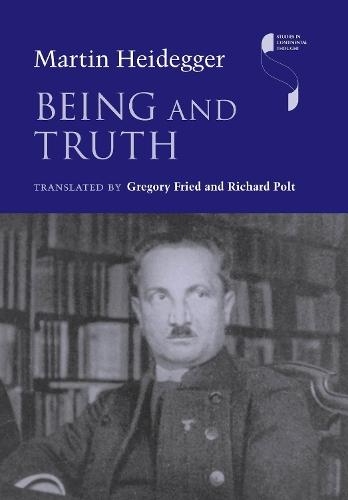Overview
In these lectures, delivered in 1933-1934 while he was Rector of the University of Freiburg and an active supporter of the National Socialist regime, Martin Heidegger addresses the history of metaphysics and the notion of truth from Heraclitus to Hegel. First published in German in 2001, these two lecture courses offer a sustained encounter with Heidegger's thinking during a period when he attempted to give expression to his highest ambitions for a philosophy engaged with politics and the world. While the lectures are strongly nationalistic and celebrate the revolutionary spirit of the time, they also attack theories of racial supremacy in an attempt to stake out a distinctively Heideggerian understanding of what it means to be a people. This careful translation offers valuable insight into Heidegger's views on language, truth, animality, and life, as well as his political thought and activity.
Full Product Details
Author: Martin Heidegger ,
Gregory Fried ,
Richard Polt
Publisher: Indiana University Press
Imprint: Indiana University Press
Dimensions:
Width: 15.60cm
, Height: 2.10cm
, Length: 23.50cm
Weight: 0.345kg
ISBN: 9780253020826
ISBN 10: 0253020824
Pages: 256
Publication Date: 25 September 2015
Audience:
College/higher education
,
Postgraduate, Research & Scholarly
,
Postgraduate, Research & Scholarly
Format: Paperback
Publisher's Status: Active
Availability: Manufactured on demand

We will order this item for you from a manufactured on demand supplier.
Reviews
Fried and Polt's translation of Martin Heidegger's Being and Truth is a well-crafted and careful rendering of an important and demanding volume of the Complete Works. -Andrew Mitchell, Emory University The two lecture courses collected in the volume entitled Being and Truth were delivered during Heidegger's tenure as the first Nazi rector of the University of Freiburg and thus in his darkest hour as a philosopher... When reading Heidegger's political statements, which frame and punctuate his otherwise thought-provoking philosophical analyses... what is most striking, ultimately, is Heidegger's utter blindness with respect to the true nature of an odious and destructive worldview and his systematic yet delusional projection of a profound transformation of Europe's destiny and a new dawn into the darkest episode of German history. -Notre Dame Philosophical Reviews -
Fried and Polt's translation of Martin Heidegger's Being and Truth is a well-crafted and careful rendering of an important and demanding volume of the Complete Works. Andrew Mitchell, Emory University
Fried and Polt's translation of Martin Heidegger's Being and Truth is a well-crafted and careful rendering of an important and demanding volume of the Complete Works. -Andrew Mitchell, Emory University The two lecture courses collected in the volume entitled Being and Truth were delivered during Heidegger's tenure as the first Nazi rector of the University of Freiburg and thus in his darkest hour as a philosopher... When reading Heidegger's political statements, which frame and punctuate his otherwise thought-provoking philosophical analyses... what is most striking, ultimately, is Heidegger's utter blindness with respect to the true nature of an odious and destructive worldview and his systematic yet delusional projection of a profound transformation of Europe's destiny and a new dawn into the darkest episode of German history. -Notre Dame Philosophical Reviews -
Author Information
Gregory Fried is Professor and Chair of the Philosophy Department at Suffolk University. He is author of Heidegger's Polemos: From Being to Politics and editor (with Richard Polt) of A Companion to Heidegger's Introduction to Metaphysics. Richard Polt is Professor in the Philosophy Department at Xavier University. He is author of The Emergency of Being: On Heidegger's Contributions to Philosophy and Heidegger: An Introduction.




